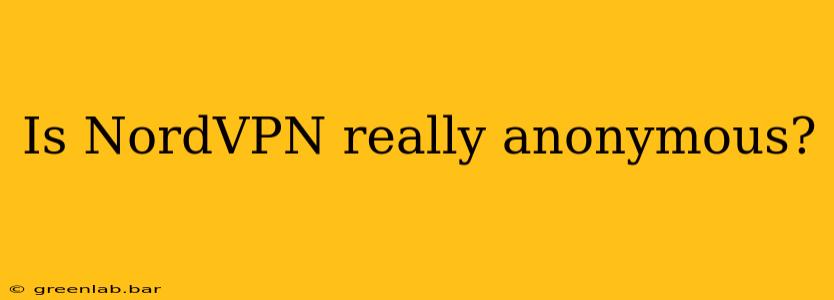The allure of online anonymity is strong, especially in today's digitally connected world. Many users turn to VPNs like NordVPN, hoping for a cloak of invisibility. But the question remains: Is NordVPN truly anonymous? The answer, unfortunately, isn't a simple yes or no. Let's delve into the complexities of VPN anonymity and examine NordVPN's strengths and weaknesses.
Understanding the Limits of VPN Anonymity
Before we assess NordVPN specifically, it's crucial to understand the inherent limitations of any VPN service regarding complete anonymity. While a VPN masks your IP address and encrypts your internet traffic, it doesn't make you invisible. Several factors can compromise your anonymity:
1. VPN Provider's Logging Policies:
This is arguably the most critical aspect. Even the most reputable VPN providers collect some data. The key is to understand what data they collect and for how long. NordVPN has a publicly stated no-logs policy, but independent audits and verification of such claims are vital for building trust. While they've undergone audits, it's important to remain critically aware that complete transparency in this area is exceptionally difficult to achieve.
2. DNS Leaks:
DNS leaks occur when your actual IP address is revealed through DNS requests bypassing the VPN. NordVPN employs measures to mitigate this, but users should independently verify their DNS settings to ensure they're routing through the VPN's DNS servers.
3. WebRTC Leaks:
WebRTC, a technology enabling real-time communication, can also expose your real IP address. NordVPN addresses this through its application's built-in protections, but users should ensure these features are enabled and functioning correctly.
4. Metadata:
Even with a VPN, metadata such as the timestamps of your online activity, the websites you visit (although not the content itself), and the amount of data transferred, can still be tracked. While this doesn't directly reveal your identity, it can still be used to build a profile of your online behavior.
5. Your Own Actions:
Your online behavior can compromise your anonymity, regardless of your VPN usage. Using unencrypted websites, revealing personal information on forums, or engaging in suspicious activities can negate the protective benefits of a VPN.
NordVPN's Security Features: A Closer Look
NordVPN boasts several security features aimed at enhancing user privacy:
- Double VPN: This feature routes your traffic through two VPN servers, adding an extra layer of encryption.
- Onion Over VPN: This combines the anonymity of Tor with the security of a VPN for enhanced privacy.
- Kill Switch: This feature cuts off your internet connection if the VPN connection drops, preventing data leaks.
- Threat Protection: This built-in feature blocks malware and malicious websites.
Conclusion: Relative Anonymity, Not Absolute Invisibility
NordVPN offers a strong level of security and privacy compared to browsing without a VPN. Its robust features and stated no-logs policy contribute to a relatively anonymous experience. However, it's crucial to remember that absolute anonymity online is practically impossible. NordVPN, like any VPN provider, operates within certain limitations.
Responsible online behavior, understanding the technical aspects of VPNs, and a healthy dose of skepticism are all essential components of protecting your privacy online, even when using a service like NordVPN. While NordVPN enhances your privacy significantly, it shouldn't be considered a foolproof solution for complete anonymity.

